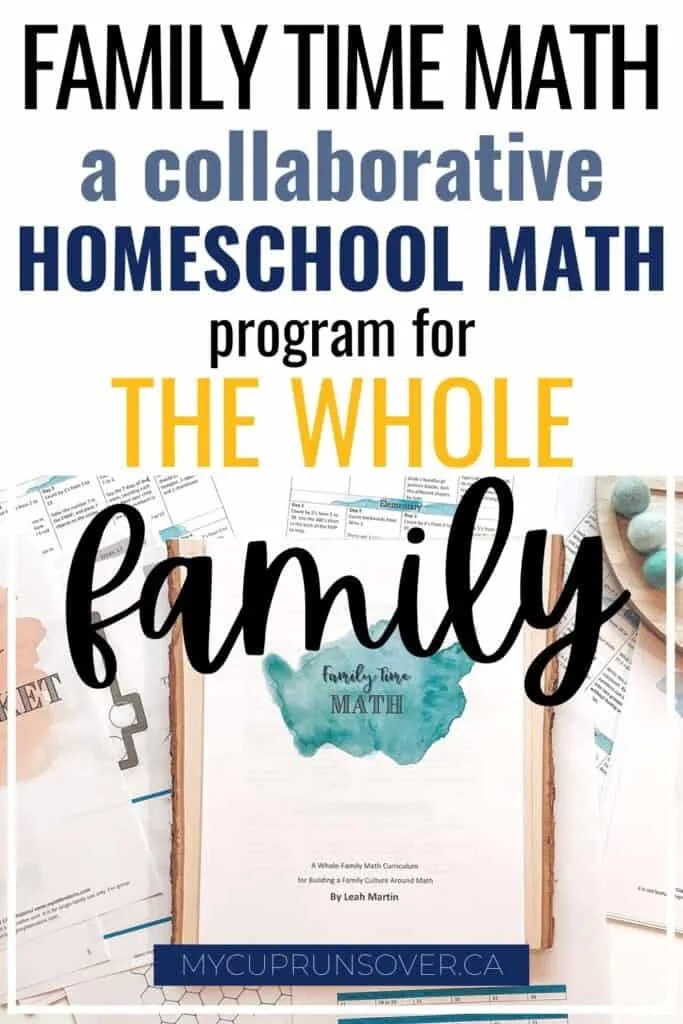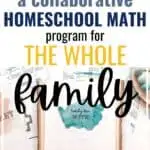Math should be fun, but it doesn’t always feel that way, even in a relaxed homeschool setting. We can put so much pressure on our kids to nail down their math skills that we tend to forget that math has a playful and exciting side too. Family Time Math is a new homeschool math curriculum from Leah at MyLittleRobins.com that helps bring some of the wonder back into homeschool math.

I received a free copy of Family Time Math for review purposes. All opinions are my own and I am not required to post a positive review.
From my first year of school to my first year of university, math was my favorite subject. Here’s a hint of how much I loved it:
- As a child, one of my favorite pastimes was to have my dad make math worksheets for me, which I’d immediately complete and beg him to mark.
- In grade five, my teacher gave me a grade six textbook and told me I could use our math time to work my way through it, and this was the highlight of my year.
- In high school, I transferred myself an out-of-district school because it had a better math program. Seriously.
When I reflect back on why math captured my heart so thoroughly from such a young age, the answer is clear: my dad loved math, and because he wanted me to love it too, he constantly engaged in numbers-based games with me.
Whether we were playing Gin Rummy or Cribbage, counting the fish we caught on our boat or calculating the money we could make selling them, or counting the miles between stops on our road trips, we always had fun playing with numbers. And because I associated math with having fun, I couldn’t get enough of it.
By university, I was mostly doing calculus, which I found to be decidedly less fun, but I never lost my fondness for math and when I became a homeschool mom, I dreamt of passing my love of the subject onto my kids.
No such luck.
While my kids are awesome at math and have come a long way in their willingness to complete their assignments without complaint, I’d say their attitude toward it is, at best, one of healthy respect. Nobody is staying up late at my house begging for math worksheets, that’s for sure.
And to be honest, I blame myself. I think because it had been so long since my love of math developed, I assumed I came by it naturally. That if one was just exposed to the beauty and simplicity of it, they wouldn’t be able to help loving it.
I completely neglected the fact that someone had gone to great effort to make it fun for me from the very beginning.
So, from the age of about six, I’ve presented my children with math workbooks, textbooks, and online curricula and hoped they’d come around. We’re still working on it, but thankfully, I don’t think it’s too late–at least not for my younger ones!
A product my fellow blogger Leah Martin at My Little Robins put together has me rethinking the way I engage with my kids when it comes to math…
Why I’m Loving Family Time Math
Family Time Math is a 36-week math program for children ages 3-11 and their parents. It is designed to be a collaborative program that family members can work on together (hence the name) to help encourage a shared love of math (or at least a generally warm sentiment!).
It’s a Collaborative Homeschool Math Program
I love several things about this concept. First, I love that family members can do it together. Math has always been the one subject that we haven’t done together as a family as each of my children has always worked at their own pace, and those paces have never lined up. Family Time Math is different, however. It allows us to move through the program together while allowing each child to work at their own level.
Each week, there are questions geared towards 3 age groups: Early Years, Elementary, and Upper Elementary. The questions gradually increase in difficulty, to help your child(ren) build a foundation in math.
Here’s an example of the “assignments” for one week. I use the term assignments loosely as these would be done together with your children, not given to them to do independently. This is not a busy work program where kids prove their knowledge by answering dozens of similar questions each week. With Family Time Math, you hit a topic, spend some time hanging out there, get comfortable with it, and then move on.
Though simple in nature, Family Time Math covers a substantial number of topics. Here’s what you can expect your kids to learn as they move through the different stages of the program, which really should last you for multiple years, especially if you have more than one child.
Early Years:
- Counting
- Developing number sense
- Identifying and writing numbers
- Vocabulary development
- Patterns Geometry
Elementary:
- Skip counting
- Addition and subtraction facts
- Number sense
- Copybook
- Patterns
- Place value
- Even and odd numbers
- Story problems
- Geometry
- Money
- Measurement
- Time
- Equal groups
- Vocabulary development
Upper Elementary
- Skip counting
- Fractions
- Multiplication and division
- Story problems
- Multi-step problems
- Geometry
- Copybook Entries
It Takes a Gentle Approach to Math
That gentle approach is the second thing that intrigues me about this homeschool math curriculum. My kids are used to doing a lot of math work. I mean A LOT. And it’s probably not necessary. Yes, repetition does build skill, but so does reflection, and Family Time Math is a much more reflective program than we’re used to.
Four days a week, you’ll find mental math questions and various activities for each level. There is also an optional fifth day that can be spent in math facts practice. Each session is blessedly short, taking just a few minutes.
I feel like there’s actually time to slow down and have conversations about math topics–the why and the how of different math facts rather than just the what. So although a nine-year old might only be asked a handful of questions a day, this leaves much more time to dig into those questions and the patterns that emerge as she tackles them.
The Family Math Activities Turn Math into an Event
The third thing I love about the Family Time math program are the family math activities scheduled each month. I think it’s a neat idea to make math a fun family game that kids can get just as excited about as they would for a movie night or a board game.
For example, one activity is to go for a nature walk and notice all the manifestations of math in nature. You might seek out the Fibonacci spiral in a pine cone or a sunflower or count the rings on a tree stump to determine its age.
These are the types of fun math activities missing from my homeschool right now, and I’m so grateful for the encouragement to not only take a more relaxed approach to teaching math but to also slow down and incorporate other things we love–like going for walks and spending time together as a family–into our exploration of math.
If anything is going to inspire my kids to grow in their love of math, I think this program has the best shot!
Come check out Family Time Math today and see if it might inspire you and your kiddos too!

Sophie Agbonkhese is a writer, homeschooling mother of four, and a recovering overachiever (who occasionally relapses). She is the founder of My Cup Runs Over, a site dedicated to helping busy women simplify and enrich their lives. When she’s not writing or debugging websites, Sophie spends her time reading, dancing, bullet journaling, reading, gardening, listening to audiobooks, and striving fruitlessly to have a clean house for at least five minutes.

